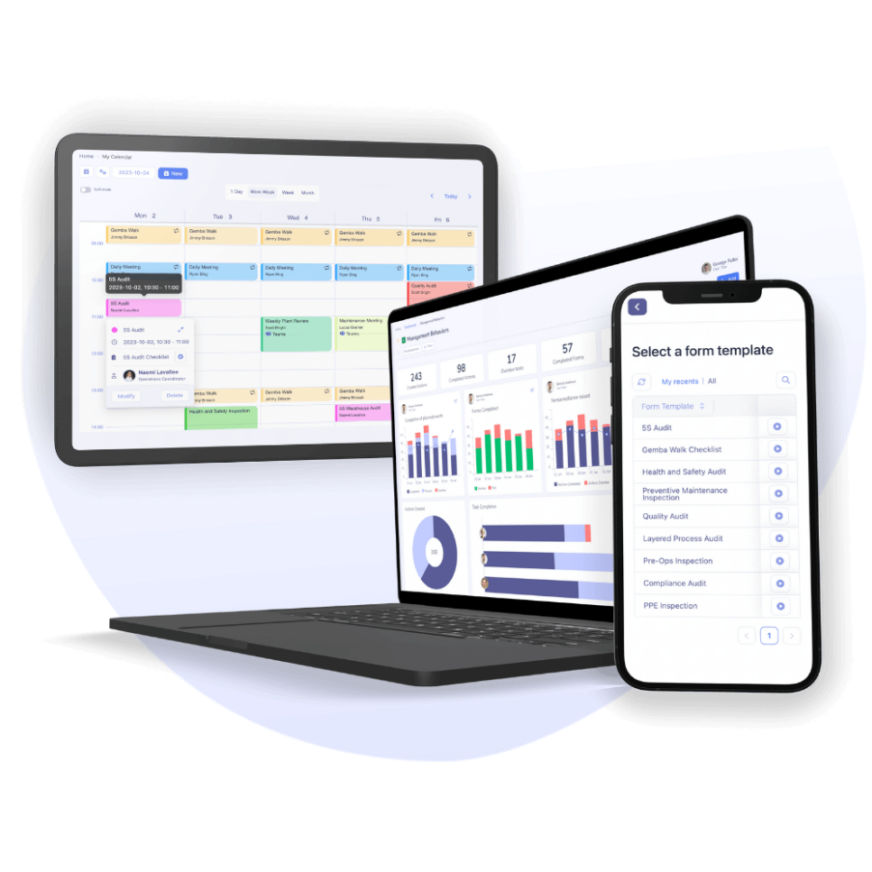Process Validation with Digital Audits

| Last updated: | June 6, 2025 |
Management practices digitalization
In this series, Management practices digitalization, we’ll explore the differences between traditional methodologies and Tervene’s approach to operations management. Discover how Tervene sets the table to a successful digital transition for inspection processes.
Inspections – Audits
Organizations that implement standards to ensure regular performance must implement a validation system. The objective is to deliver a quality product within the promised time frame using the human, financial and material resources provided. Human intervention in processes can lead to performance irregularity. Establishing and validating standards helps in reducing this irregularity.
An audit is a recurring inspection process of the organization’s standards. It enables an objective assessment of quality and operational standards, as well as competencies and management behaviours.
Following the audit’s execution, an auditor must implement corrective actions to remedy non-conformities that prevent the desired standard from being met.
Audit challenges and conditions for success
The challenge is to ensure non-compliances are addressed and to maintain rigour in the inspection process’ execution. The following conditions can be critical in promoting rigorous inspections:
- The audit is simple to perform;
- Managers have visibility on the audits performed;
- The data collected is usable and user-friendly to manage;
- Monitoring and corrective actions are carried out;
- Auditees receive feedback following an evaluation of the quality of their work.
Traditionally
Most audits are carried out with simple tools, such as paper forms. Auditors take notes, complete the form and sometimes retranscribe the same data in an Excel spreadsheet.

With a paper form, you can carry out an audit and take action on non-compliances. Nevertheless, it is essential to ask yourself questions:
- Is the inspection easy to perform?
- Do managers have visibility on the audits performed?
- Is the data accessible?
- Is the data usable?
- Is it simple and efficient to attribute tasks?
- Is it simple to follow-up, give feedback and carry out corrective action?
With Tervene
Tervene’s audit digitizes the inspection process, which allows real-time task attribution and monitoring of corrective actions.

After performing an audit, the auditor has numerous options:
- Assign a task to a manager;
- Send the task to a meeting;
- Send an audit report to a meeting;
- Send the audit report directly to the process manager
Discover Tervene’s LPA tools
Comparison
| Traditionally | With Tervene | |
|---|---|---|
| Number of steps | 5 | 3 |
| Duration (min) | 120 | 50 |
| Instantly send corrective action | ✘ | ✔ |
| Real-time dashboard | ✘ | ✔ |
| Send report to a meeting | ✘ | ✔ |
| Seamlessly update standards and audit forms | ✘ | ✔ |
| Photos integrated in audit report | ✘ | ✔ |
Benefits
Manufacturers
At the organizational level, digitizing inspection processes promotes better compliance with standards, enables easier non-compliance management and increases rigour.

Data utilization increases the perceived value of the inspection process, leading to greater rigour in its execution.
Process owners
- Single data entry
- Increased visibility on audits performed
- Visibility on processes compliance
- Collected data is easy to analyze and use
- Enable data-driven management behaviour coaching
- Visibility on all corrective actions related to process improvement
Auditor
- Save time
- Single data entry
- Increased feedback and follow-up following the completion of its audits
- Traceability of prior data
- User-friendly audit execution and data processing
Audited (when applicable)
In the case of a behaviour review:
- Feedback on audit results
- Improved performance, because the audited person knows that the reports will be seen and used
- Shows the seriousness of the organization in compliance with standard procedures
- Active participation in the improvement of the process

























